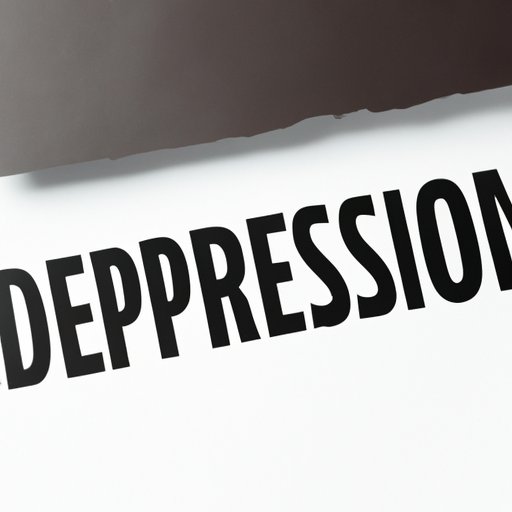
Introduction
Depression is a complex condition that can cause emotional, cognitive, and physical symptoms. An individual with depression may experience feelings of sadness, lack of energy, and a loss of interest in activities they once enjoyed. In some cases, depression can also contribute to weight gain. It’s important to understand the link between depression and weight gain to recognize when you or someone you know may need assistance in improving mental and physical health.
The Correlation Between Depression and Weight Gain: Research Findings
Research studies have shown a strong link between depression and weight gain. Individuals with depression are more likely to gain weight than those without the condition. Depression can often cause significant changes in metabolism, hormones, and other body functions that can contribute to weight gain.
One reason for the link between depression and weight gain is the vicious cycle between depression and overeating. Overeating or comfort eating is often used as a coping mechanism for individuals with depression. In turn, weight gain can lead to further depression and worsen existing symptoms.
The Vicious Cycle of Depression and Overeating – Breaking the Pattern
The first step in breaking the cycle of depression and overeating is recognizing the issue. It’s essential to identify the signs of depression and understand how they connect to food behaviors. Once identified, ways to break the pattern can be pursued.
Working with a therapist or mental health professional can help develop new coping mechanisms to manage depression without relying on food. Engaging in physical activity, practicing mindfulness, and spending time with friends or loved ones can also be effective ways to break the cycle of depression and overeating.
How Your Mental Health Can Affect Your Physical Health: Depression and Weight Gain
Untreated or poorly managed depression can lead to other physical health conditions, including obesity, heart disease, and diabetes. One roadblock to losing weight while managing depression is the medication prescribed to treat the condition.
Many medications commonly prescribed for depression can cause weight gain. It’s essential to discuss side-effects with a healthcare provider and explore ways to manage medication-caused weight gain while staying on track with mental health treatment.
Comfort Eating and Depression: Coping Mechanisms That Can Lead to Weight Gain
Comfort eating is a common coping mechanism for depression. While it may provide temporary relief, it can lead to further weight gain and worsen existing symptoms. Identifying when comfort eating becomes a problem is necessary to break the cycle of depression and overeating.
Alternative coping mechanisms that do not involve food can be developed with the help of a mental health professional. Engaging in physical activity, journaling, or spending time with supportive friends or loved ones can be effective ways to manage depression without relying on food.
Understanding Depression-Related Weight Gain: Tips to Managing Your Weight and Mental Health
Managing weight gain while dealing with depression can be challenging. Making small changes, establishing achievable goals, and developing a support system can help manage physical and mental health simultaneously.
It’s important to prioritize mental health and seek appropriate assistance when necessary. Working with a healthcare provider to develop a treatment plan that addresses both mental and physical health is ideal.
The Connection Between Depression, Medications and Weight Gain: A Comprehensive Overview
Many medications prescribed for depression can cause weight gain. It’s essential to discuss the side-effects of medications with a healthcare provider and develop ways to address medication-caused weight gain.
Working with a healthcare provider can help manage weight gain while continuing to receive treatment for depression. Exploring alternative medications or developing a plan to address medication-caused weight gain can prevent worsening existing symptoms and improve overall well-being.
Conclusion
Depression can cause physical and emotional symptoms, including weight gain. The connection between depression and weight gain emphasizes the importance of addressing both mental and physical health when managing depression.
Breaking the vicious cycle of depression and overeating requires recognizing the issue, developing alternative coping mechanisms, and seeking appropriate assistance. Working with a healthcare provider to address medication-caused weight gain can also aid in managing both physical and mental health.
Overall, taking care of mental and physical well-being is crucial when managing depression and weight gain. Seeking help, making small changes, and establishing achievable goals can improve overall health and well-being.





